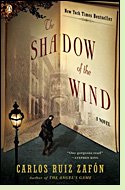The Shadow of the Wind
by Carlos Ruiz Zafón
Reviewed by Margaret Donsbach

At first, The Shadow of the Wind seems to head in the direction of magical realism. In 1945 the narrator's father, a bookseller in Barcelona, brings him to "the Cemetery of Forgotten Books," and tells him it is "a place of mystery, Daniel, a sanctuary. Every book ... has a soul." Daniel is allowed to select a forgotten book and "adopt it, making sure that it ... will always stay alive." He chooses The Shadow of the Wind by Julián Carax. After reading it avidly, he decides to read the author's other novels, only to learn someone else has been systematically searching for and destroying them.
Zafón's novel is not really about the importance of books, and although the events and characters are exaggerated enough to stretch credibility, it's not a work of magical realism. It's about love: the suddenness with which passion can strike, the heartbreak when two people fail to love equally, the tragedy of forbidden love, and the soul-poisoning nature of jealousy. As Daniel grows from child to young man, he falls in love in a way that strangely echoes the lovers in Carax's novels. His quest for the life story of their author turns up similar echoes.
Carax's tragedy played out during the Spanish Civil War. Daniel's search attracts the attention of a man who profited during and after the war from his relish for killing and his willingness to change loyalties whenever expedient. A civil war, the novel suggests, does not end when the victorious side takes over the government. It lives on in the former combatants who continue to lust for violence and in the moral paralysis of civilians who continue to fear them. (2001 in the original Spanish; English translation 2004, 487 pages)
More about The Shadow of the Wind at Powell's Books, Amazon.comOther novels about the Spanish Civil War:
Winter in Madrid by C.J. Sansom (2006), about a reluctant British spy scarred by his World War I experiences, who is sent to Madrid during the aftermath of the Spanish Civil War. See review or more info at Powell's Books
Books Burn Badly by Manuel Rivas (2010), about life during the Spanish Civil War and Franco's dictatorship. More info
The Mule by Juan Eslava Galan (2003 in the original Spanish, 2007 in English), about a muleteer caught in the brutality of the Spanish Civil War and his persistent efforts to protect his mule. More info
Nonfiction about the Spanish Civil War and the Franco regime:
The Spanish Civil War: Reaction, Revolution, and Revenge by Paul Preston (2007), about the war. More info
Appeasement's Child: The Franco Regime in Spain by T. Hamilton (1943), about the war's aftermath. More info
The Masquerade in Spain by C. Foltz (1948), about the war's aftermath. More info
Online:
Barcelona and the Spanish Civil War, background for the Norfolk Library Book Group's discussion on The Shadow of the Wind
Back to 20th Century, Europe Between the World Wars
Back to Directory of Book Reviews